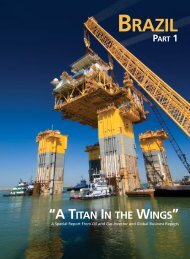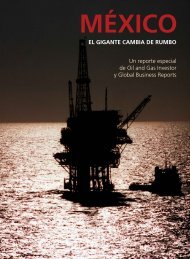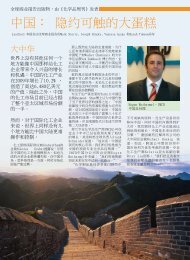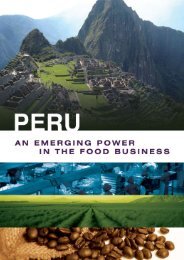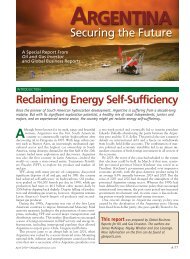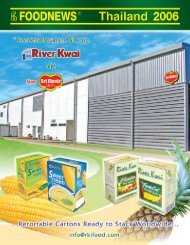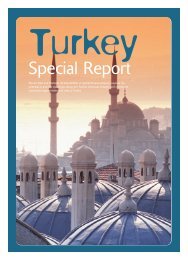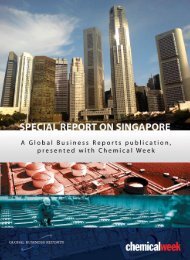Turkey Chemicals 2005 - GBR
Turkey Chemicals 2005 - GBR
Turkey Chemicals 2005 - GBR
Create successful ePaper yourself
Turn your PDF publications into a flip-book with our unique Google optimized e-Paper software.
COUNTRY FOCUS: TURKEY<br />
Customs Union,<strong>Turkey</strong> has a solid tradition of international<br />
trade. The chemical industry, mainly inward looking in<br />
the past, is today increasingly raising its global profile and<br />
ambitions.<br />
As a key contact point between Asia and Europe, the<br />
Middle East and Central Asia,<strong>Turkey</strong> is poised to be a logistical<br />
center of choice. For years, insufficient port capacities,<br />
the lack of rail infrastructure and bad roads have hampered<br />
this potential.Today, things are changing. Private sector initiatives,<br />
an increase in demand for state of the art logistical<br />
solutions and further potential for growth leave ample room<br />
for more development in the logistics segment. (See<br />
Logistics)<br />
The Turkish chemical industry is fragmented, with over<br />
6,000 companies in the sector, of which 90% are SMEs and<br />
only 150 large scale enterprises, with 60 companies making<br />
up 65 % of the sector’s revenue.The main companies of the<br />
sector are state-owned refining and petrochemical producers<br />
Tüpras and Petkim.The two companies share a common<br />
destiny, as both have been on the privatisation list for years<br />
and have experienced stalled attempts on more than a few<br />
occasions. Providing up to 84% of the country’s needs in<br />
refined petroleum products, Tüpras is also a producer of<br />
petrochemical products. Petkim is the major petrochemical<br />
producer of <strong>Turkey</strong>, feeding 30 % of the Turkish demand.<br />
This leaves ample room for imports of plastics and the market<br />
absorption capacity is decidedly on the rise on the back<br />
of consumption increases in the automotive and home<br />
appliances industries. The privatization of Petkim, with a<br />
first phase expected to be completed by mid-<strong>2005</strong>, is also<br />
widely anticipated by the sector at large and by the international<br />
investment community. (See Petrochemicals and<br />
Privatization)<br />
Meanwhile, heavy and specialty chemicals, although not<br />
huge in terms of the scale of production, makes it up in style.<br />
Small to medium size private producers are fueling the sector<br />
with dynamism and ambition and enjoy the benefits of<br />
a huge domestic market featuring increasing consumption<br />
levels. Their story is also that of Turkish entrepreneurs in<br />
general, learning to cope with the uncertainties and the<br />
instability that have plagued the country’s economy for two<br />
decades.This difficult environment gave birth to a wealth of<br />
forward-thinking companies that provide <strong>Turkey</strong> with a<br />
good production base which can easily nurture further<br />
investment in production capacities. ( See Alchemy for success)<br />
Paint makers notably account for some of the most<br />
dynamic operators in the country, and have attracted much<br />
foreign attention. (See Paints)<br />
The country is also host to a buoyant pharmaceutical<br />
industry that has prospered servicing the national health<br />
system. Now facing the tightening of margins due to the<br />
ongoing painful reform of the social security system and the<br />
raging competition brought to the market by international<br />
drug-makers, the local players are turning to international<br />
markets for breathing space. Local competencies are proven,<br />
but major markets like the United States aren’t easy to penetrate.<br />
Here again, Turkish manufacturers are striving to<br />
reach international standards and reinforcing their presence<br />
on global markets. (See Pharmaceuticals in <strong>Turkey</strong>: strong<br />
remedies required)<br />
All in all, the country has gone through a stunning transformation<br />
since the last financial crisis 3 years ago. Once a<br />
country wrought with constant economic meltdowns, the<br />
new political and economic stability of today means that<br />
managers no longer have to concentrate on crisis management,<br />
but can concentrate on day to day management and<br />
future strategy.Although by no means in the clear, the early<br />
indicators are that real progress has been made and the<br />
chemical sector is one of the sectors that has really benefited<br />
from <strong>Turkey</strong>’s renewed strength.<br />
36<br />
November 24, 2004<br />
A Global Business Reports Publication,presented with Chemical Week





